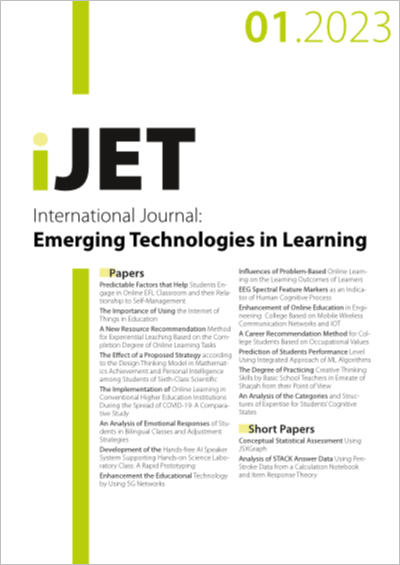The Effect of a Proposed Strategy according to the Design Thinking Model in Mathematics Achievement and Personal Intelligence among Students of Sixth-Class Scientific
DOI:
https://doi.org/10.3991/ijet.v18i01.35981Keywords:
Proposed Strategy, Design Thinking Model, Mathematics, Personal Intelligence, Students Sixth-Class Scientific.Abstract
— Researcher adopted the experimental research method with two groups (experimental; control) with a posttest; to know the impact of a proposed strategy according to the design thinking model on the achievement of mathematics and personal intelligence among students sixth-class scientific. The null hypotheses were made "there is no statistically significant difference at the significance level (0.05) between the mean scores of students sixth-class scientific (biology) who learned the mathematics subject assigned to them according to proposed strategy (the experimental group) with students who learned the same material by usual way (control group) in test of achievement, also “there is no statistically significant difference at the significance level (0.05) between the mean scores of the students sixth-class scientific (Biology) who learned the mathematics subject assigned to them according to the proposed strategy (the experimental group) and between the students who learned the same material by usual way (the control group) in the personal intelligence scale”. Community of research represent students sixth-class scientific (biology) from the General Directorate of Education of Karkh First. Research sample was selected (60) students, and the sample was divided into two groups (experimental) and (control). The equivalence of both groups was made in (previous achievement in “Mathematics”, “level of intelligence”, “chronological age”). For collecting data to the experiment, an achievement test was built in of (10) test paragraphs of essay type, plus a scale to measure personal intelligence with five test paragraphs. Analyzes were conducted the appropriate statistic, and the psychometric properties of the test were confirmed. Results indicated that students of the experimental group who studied according to the proposed strategy were superior to the students of control group who studied by usual method.
Downloads
Published
How to Cite
Issue
Section
License
Copyright (c) 2022 Areej Khuder Hassan

This work is licensed under a Creative Commons Attribution 4.0 International License.



